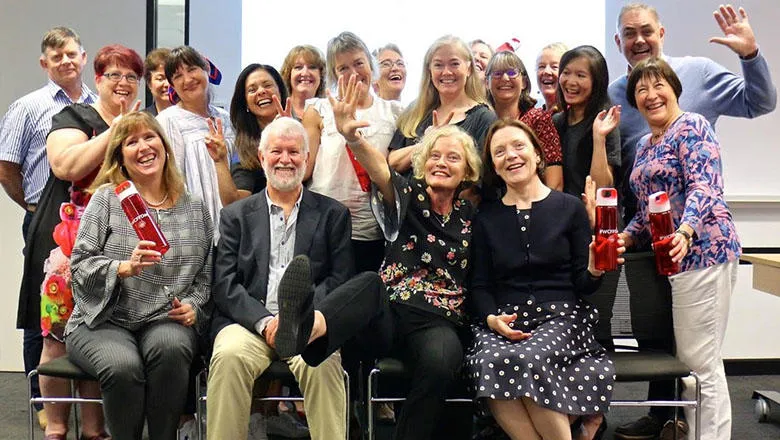19 February 2019
An in-depth look at: the Alliance for a Cavity-Free Future
For the last five years, a small yet effective group has been taking root at King’s College London.

Having been recognised in 2018 as a King’s College Exemplar for Service, the ACFF continues to make waves and demonstrate impact globally. So who are the ACFF, and what do they do?
The Alliance for a Cavity-Free Future’s (ACFF’s) global office is based within FoDOCS, with Professor Nigel Pitts (FoDOCS Impact Lead) sitting as Global Chairman of the organisation, and a number of other King’s staff supporting. The ACFF is a registered charity, founded in 2010 when a group of like-minded dental academics and professionals joined forces to create an international organisation dedicated to fighting dental caries- the disease which when left unmanaged and untreated can lead to tooth decay. Since 2013, the ACFF has made its home within the faculty and has been carving a space for itself within international dental discussion. The ACFF is built around challenging the misconception that tooth decay need be an inevitable part of life, and works to create a world where it is not viewed as such. The stretch goal of the Alliance is that ‘Every child born in 2026 and thereafter should stay cavity-free during their lifetime.’
Through an international network of ACFF Chapters (27 at the point of writing) operating in over 40 countries, local teams are working to increase awareness of the caries process within their communities, promoting best oral health practices and offering education on the behavioural and dietary aspects of preventing tooth decay. ACFF Chapter groups have also been instrumental in pushing forward the reformation of the dental curriculum in universities to include a more comprehensive cariology syllabus and a more preventive focus. These updated curricula are in the process of being implemented across Europe, the USA, and also in countries such as Colombia and Malaysia.

Members of the ACFF Canada/US and Australia/New Zealand Chapters.
In addition to the local Chapter activity, there are a range of ACFF initiatives and projects which are operated at an international level. The ACFF has built a global network of partner organisations and associations with whom they work closely in order to increase awareness and to promote the ACFF agenda across the international dental landscape. By sharing best practices and resources amongst practitioner and public health groups, student organisations and other NGO’s, the Alliance network has become wide branching, working assertively towards achieving mutual goals, and collaborating to see a reduction in caries inequality across countries and social groups. The ACFF also conceived and launched ‘World Cavity-Free Future Day’, an international awareness day held annually on October 14th focused on raising awareness of caries and sharing public focused oral health messaging.
In addition to maintaining their Chapter and partner networks, the ACFF also has got one foot in the political domain. In 2017 and 2018, the ACFF hosted two very successful ‘Policy Lab’ events in association with the Policy Institute at King’s. The first of these was focused on the question of how to accelerate a policy shift towards increased resource allocation for caries prevention and control. Attended by multiple policy makers and government officials from around the world, this event marked the start of a new period of focus for the ACFF, and was a springboard for a series of in depth, high level policy discussions to take place. The 2018 Policy Lab built on the success of the previous year, and looked at how we can work to create (and implement) prevention-based dental payment systems within established (or new) health systems. By bringing practitioners on board alongside policy makers and other stakeholders to battle through the key issues, this event resulted in the creation of a guidance document which can be used to initiate discussion about how to achieve this change within governments around the world. This has already been picked up by a number of countries, and the ACFF will continue to work closely with them and other interested parties as they manoeuvre towards implementing changes to their health systems.
The ACFF will be working to keep building on the momentum from the Policy Lab events through the creation and maintenance of a ‘Policy Change Network’ who will continue to promote the possibilities raised through these events to a global audience. The ACFF will also be creating a membership network, which will allow the opportunity for interested individuals from around the world to join the Alliance network, share ideas and best practice and gain access to resources and tools which can be utilised in their daily work or practice to share the ACFF messages and help people and patients to move towards a Cavity-Free future. The team are hugely excited about the possibilities this will bring, and hope to see many King’s students and staff on the members list when the initiative launches this summer.
For further information about the ACFF please visit www.acffglobal.org
Delivering the UN Sustainable Development Goals
King's College London has a long and proud history of serving the needs and aspirations of society. We are committed to the UN Sustainable Development Goals (SDGs) as a university, and we use them as a framework for reporting on our social impact. The SDGs are a set of 17 goals approved by the 193 member states of the United Nations (UN) which aim to transform the world by 2030. This initiative supports SDGs 3 and 17.

